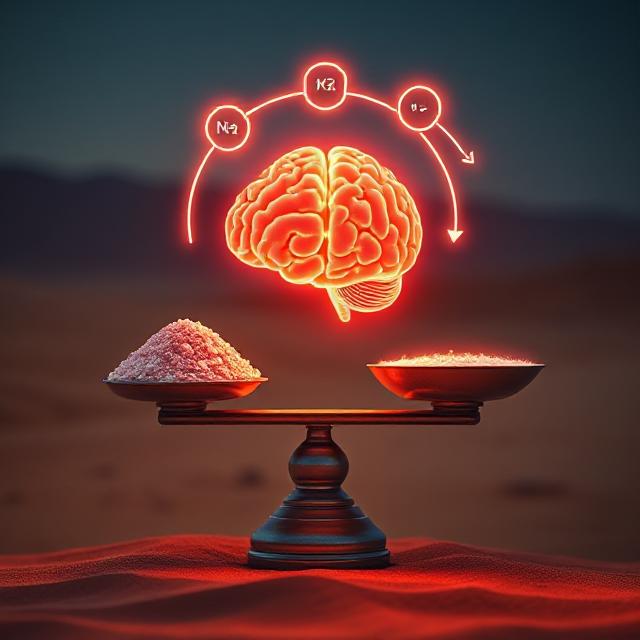
Table of Contents
Sodium Regulation and Mental Performance
When you think of sodium, your mind might jump to blood pressure or salty snacksânot sharp thinking or high cognitive output. But sodium plays a central role in brain function, acting as a gatekeeper for electrical signals, hydration balance, and mental clarity.
Whether youâre a student aiming for deep focus, a professional combating brain fog, or someone experimenting with fasting or low-carb diets, understanding sodium regulation and mental performance is key to unlocking consistent energy and cognitive sharpness.
ğ§ Why Sodium Is Crucial for Brain Function
Sodium is a major electrolyte, meaning it helps conduct electrical impulses between neurons. These impulses are the foundation of every thought, emotion, and action you take.
Key functions of sodium in the brain:
- Initiates action potentials (the electrical signals neurons use to communicate)
- Helps regulate fluid balance inside and outside brain cells
- Assists in glucose transport across the blood-brain barrier
- Influences neurotransmitter activity (especially glutamate and GABA)
Without adequate sodium, neurons struggle to fire properly, resulting in sluggish cognition, irritability, and poor focus.
âï¸ Sodium Balance: The Cognitive Sweet Spot
Too much sodium, and you might feel jittery, anxious, or overstimulated. Too little, and you risk brain fog, fatigue, and even dizziness. The key is balance, not elimination.
Cognitive symptoms of sodium imbalance:
| Too Low (Hyponatremia) | Too High (Hypernatremia) |
|---|---|
| Brain fog | Headaches |
| Lethargy | Irritability |
| Confusion | Anxiety |
| Muscle cramps | Poor sleep |
| Dizziness | Dehydration-induced fatigue |
Mild sodium deficiency is common among:
- Endurance athletes
- People on low-carb or keto diets
- Intermittent fasters
- High-stress individuals with adrenal fatigue
- Overhydrated individuals
ğ¬ Sodium and Neurotransmitters
Sodium doesnât just help neurons fireâit also modulates neurotransmitters, which directly impact focus, mood, and memory.
Sodiumâs role in:
- Glutamate: Primary excitatory neurotransmitterâsupports learning, attention, and mental drive.
- GABA: Inhibitory neurotransmitterâsodium helps GABA receptors function, influencing calm and relaxation.
- Serotonin & dopamine: Sodium helps regulate their transport and receptor sensitivity, affecting motivation and mental resilience.
This makes sodium balance essential for emotional regulation and attention span.
𩺠Sodium in Fasting, Keto, and Low-Carb Lifestyles
If youâve adopted fasting or a low-carb/keto diet, your sodium needs change dramatically.
Why?
- Low insulin levels cause kidneys to excrete more sodium and water
- This creates an âelectrolyte dumpâ that leads to symptoms like:
- Brain fog
- Dizziness
- Low energy
- âKeto fluâ
Sodium replacement during fasting or low-carb adaptation is not optionalâitâs foundational to maintaining mental performance and physiological equilibrium.
ğ§ Sources of Brain-Friendly Sodium
Not all sodium is created equal. Table salt contains only sodium chloride and often lacks supporting minerals like magnesium or potassium.
Better sodium sources:
- Himalayan pink salt or Celtic sea salt â provides trace minerals
- Electrolyte powders with balanced ratios (sodium, potassium, magnesium)
- Homemade bone broth â rich in natural sodium, glycine, and collagen
- Mineral water â some varieties contain ~50â150 mg sodium per liter
Aim for natural sodium sources paired with fluid intake, especially during:
- Morning hours (to break the overnight fast)
- Mid-day slumps
- Exercise or sauna sessions
- Fasting windows
â±ï¸ When to Regulate Sodium for Mental Edge
| Time | Reason |
|---|---|
| Morning | After overnight fasting, sodium helps rehydrate cells and spark alertness |
| Pre-focus work | Supports stable neural firing and reduces distraction |
| During long study sessions | Prevents brain fatigue from sustained effort |
| Post-workout or sauna | Replenishes lost electrolytes for mental recovery |
| Low-carb days | Offsets sodium loss from insulin drop and helps maintain energy |
Sodium, when timed correctly, becomes a cognitive ally, not a dietary villain.
ğ§ DIY Brain-Boosting Electrolyte Drink
Want a smarter alternative to sugary sports drinks?
Basic Formula:
- ¼ tsp sea salt or pink salt (~500â600 mg sodium)
- 1 tbsp lemon or lime juice (vitamin C support)
- ½ tsp cream of tartar (adds potassium)
- 12â16 oz filtered water
Optional: Add a few drops of trace mineral drops or magnesium glycinate for a more complete blend.
Drink during your morning routine or mid-focus session to reignite brain voltage.
𧩠The Sodium-Magnesium-Potassium Triangle
Sodium doesnât act in isolation. It functions best when balanced with other key minerals:
- Magnesium: Calms overactive neurons and supports sodium/potassium pumps.
- Potassium: Balances sodium to regulate nerve impulses and prevent overstimulation.
The ideal sodium-to-potassium ratio depends on your lifestyle, but generally:
- High-activity days â More sodium needed
- High-carb meals â Less sodium needed
- Fasting/low-carb â Sodium > potassium for brain clarity
Track your symptoms: dry mouth, sluggish thinking, eye twitching, or irritability often signal mineral imbalance.
â Final Reflection: Sodium as a Brain Regulator
The modern narrative has vilified sodium for its impact on heart healthâbut your brain thrives on it when regulated intelligently.
Sodium powers attention, mental resilience, memory encoding, and emotional balance. Too little, and your thoughts grow dim. Too much, and overstimulation follows. The key is knowing your unique needs and adjusting based on diet, activity, and cognitive load.
Donât fear salt. Understand it.
Donât chase brain hacks. Balance your minerals.
Sodium is not the enemyâitâs an overlooked neuroelectric ally.
